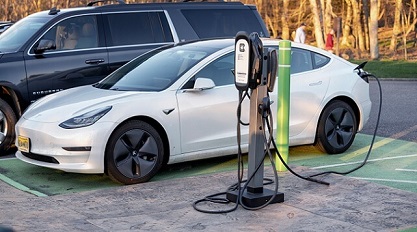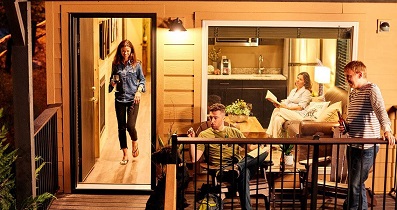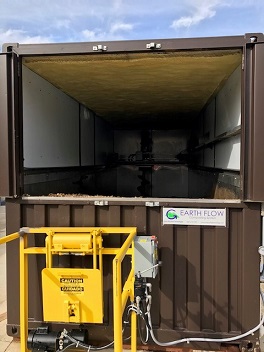
BUFFALO, N.Y.—With much of the pandemic in the rearview mirror, Buffalo, N.Y.-based Delaware North is continuing to build on its long-standing commitment to grow GreenPath, the company’s robust stewardship platform that has been in place since the 1990s. The key branches of GreenPath include environmental management, community involvement, facilities & asset protection, healthy living, and interpretation and education.
“Delaware North’s GreenPath program is very much at the heart of our company’s culture,” says Debbie Friedel, Corporate Director of Sustainability for Delaware North. “It remains a driving force thanks to our leaders and caring associates who put ideas into action.”
For its efforts, GreenPath has won dozens of awards from NASA, the U.S. National Park Service, the U.S. Environmental Protection Agency, the U.S. Travel Association, airports, municipalities, sports and entertainment venues and others.
Delaware North has its toes in areas of the economy ranging from gaming to retail to sport service, but it is its Parks and Resorts division that is of interest here. Delaware North owns and operates lodging units at both the national and state park level. Properties are in such well-known destinations as Yellowstone, Grand Canyon, and Shenandoah national parks, as well as Niagara Falls State Park—America’s oldest.
Solar at Tenaya Lodge at Yosemite
One of Delaware North’s prominent owned and operated properties is Tenaya Lodge at Yosemite. There, the company recently added solar to one of its cabins as a test. That cabin is now entirely off the grid. Guests renting that cabin do not know about its special features until they arrive. “We have some communication in the cabin to help them understand,” says Vicki McMichael, Director of Compliance and Sustainability for Delaware North. The company has plans to expand its off-the-grid efforts to other properties it manages.

To further reduce energy consumption, Delaware North consistently changes out old equipment with energy-saving versions, does simple things such as encouraging staff to set thermostats at energy-saving levels, encourages staff to ride bikes, and provides an employee van at Tenaya Lodge. At a Marriott that it owns and operates in Titusville, Fla., the company has installed electric vehicle charging stations for the property’s April 8 opening.
Delaware North towel and linen reuse programs save energy, water and chemicals while extending the life of guestroom assets. Five-minute shower timers prompt guests to save both energy and water. Thawing food using water is discouraged, preventive maintenance programs prevent and eliminate water leaks, and in dining areas water is served upon request. At Tenaya Lodge at Yosemite, an AquaRecycle system is used to recycle 100 percent of laundry wastewater. The system provides 80 percent water and sewer savings and 50 percent energy savings.
Zero-Waste Goals
Delaware North properties have zero-waste goals. “At every property we manage there is an emphasis on waste reduction,” McMichael says. The “Last Straw” campaign eliminated plastic straws in exchange for compostable versions and those straws are only made available upon request. The company is moving toward compostable cutlery and is eliminating plastic bottled water and replacing it with water-filling stations while prioritizing reusable containers.

Delaware North says that by 2025, it will source 100 percent of single-use packaging products in the United States from materials that are recyclable, renewable, compostable or contain post-consumer content.
“We have a food donation program at all locations,” Friedel adds.
A Sustainable Purchasing Program is one of the most important steps made upstream to reduce impacts from purchases made throughout Delaware North operations and to manage waste downstream. The company increases the sustainability and transparency of its supply chain by integrating responsible sourcing into the procurement of all products and services.
Going Local, Responsible Sourcing
McMichael says local vendors and seasonal produce is emphasized at all locations and in some cases food items are grown onsite—herbs at Sequoia National Park, for example. “It has gotten easier to find local products after the pandemic,” she says.
In the United States, as of January, U.S. operations were sourcing about 95 percent of both shell eggs and liquid eggs from cage-free hens. The goal is to reach 100 percent. Programs to improve the living conditions for other protein sources have also been put into place. Chefs use plant-based “meat” proteins and provide alternatives for dairy products.
To ensure continuous progress and consistency in operations, environmental managers and GreenPath champions are located at each property. Delaware North has also obtained official approval for its efforts. Tenaya Lodge at Yosemite, for example, has three LEED certifications.
Community Participation
Where possible, Delaware North partners with local park conservancies and asks guests to make donations. The company believes that social responsibility is the duty and hallmark of being an exceptional corporate citizen. Delaware North engages in myriad actions through volunteerism, donations, services, and events to make a difference in people’s lives. Company associates also roll up their sleeves in and around their communities, participating in events such as roadside cleanups, electronic recycling initiatives and tree planting.
Glenn Hasek can be reached at greenlodgingnews@gmail.com.






